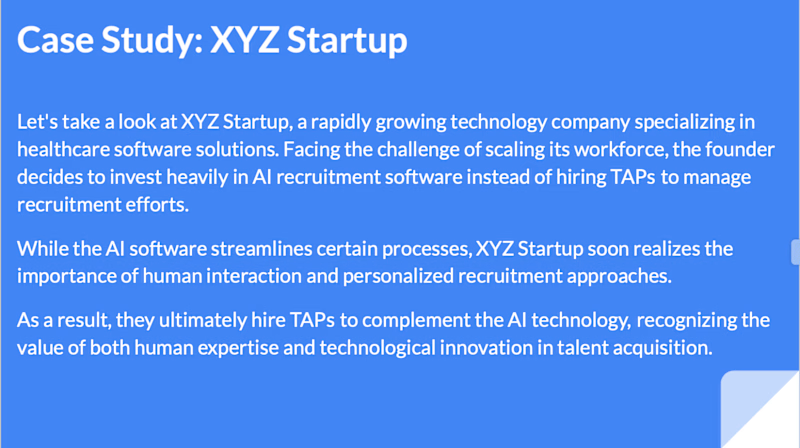Hey there, future recruiters and job seekers!
Ever wondered if the role of Talent Acquisition Partner (TAP) is a dying trade? Let’s dive into the exciting world of talent acquisition and explore this burning question.
Picture this: You’re at a massive party, surrounded by all sorts of people with different personalities and interests. Now, imagine you’re a matchmaker, tasked with finding the perfect pairings among these diverse individuals. Well, being a TAP is kind of like being a matchmaker, but for jobs instead of hearts. It’s all about making connections, finding the right fit, and sparking some professional magic.

Image by rawpixel.com on Freepik
But wait, there’s a new player in town: artificial intelligence (AI) recruitment software. These high-tech tools are like the Robin to a TAP’s Batman — helpful sidekicks that can crunch data, sift through resumes, and speed up the hiring process. With AI on the rise, some are questioning whether the role of TAP is becoming obsolete.

Image by master1305 on Freepik
But hold on just a second! While AI can certainly streamline certain aspects of the recruitment process, there are some things it just can’t do. Like building genuine connections with candidates, understanding company culture, and making those gut-level decisions that can’t be quantified. That’s where TAPs shine brightest, bringing their human touch and intuition to the table.
Furthermore, the impact of AI on recruitment cannot be understated. AI-powered tools have revolutionized various aspects of the hiring process, from resume screening to candidate sourcing. For instance, AI algorithms can analyze thousands of resumes in a fraction of the time it would take a human recruiter, helping to identify top candidates more efficiently. Additionally, AI-driven chatbots and virtual assistants have transformed candidate engagement, providing round-the-clock support and answering queries instantly. While these advancements have undoubtedly increased the speed and efficiency of recruitment, they also raise important questions about the role of human recruiters.
Despite the capabilities of AI, there are still critical aspects of recruitment that require human judgment and empathy, such as assessing cultural fit and building rapport with candidates. Therefore, while AI has become an invaluable tool in the recruitment toolkit, it should be seen as a complement rather than a replacement for the expertise and intuition of human recruiters.
Looking ahead, the recruitment industry is poised for further evolution with the emergence of new trends and technologies. Predictive analytics, virtual reality assessments, and gamification are among the key areas expected to shape the future of recruitment. Predictive analytics, for example, allows recruiters to forecast future hiring needs and identify potential candidates based on data-driven insights. Virtual reality assessments offer immersive experiences for candidates, allowing recruiters to assess skills and competencies in a more engaging and realistic environment. Additionally, gamification introduces elements of competition and interactivity into the recruitment process, making it more enjoyable for candidates while providing valuable insights for recruiters.
These emerging trends present both opportunities and challenges for TAPs. On one hand, they offer innovative solutions for streamlining recruitment processes, enhancing candidate experiences, and improving decision-making. On the other hand, they require TAPs to adapt to new technologies, acquire new skills, and navigate potential ethical and legal considerations. As the recruitment landscape continues to evolve, TAPs will play a crucial role in leveraging these trends to attract top talent, drive organizational success, and create meaningful connections between candidates and employers.

So, is the role of TAP a dying trade? Perhaps not. While AI technology may continue to reshape the recruitment landscape, there will always be a need for human recruiters who can build relationships, understand company culture, and make strategic hiring decisions. By embracing technological advancements while leveraging the unique strengths of human recruiters, organizations can navigate the evolving recruitment landscape and thrive in the digital age.
We want to hear from you! What are your thoughts on the future of the TAP role in an AI-driven world? Share your insights, questions, or experiences in the comments below. Let’s start a conversation and explore the future of talent acquisition together!
In conclusion, while the role of TAP may evolve in response to technological advancements, it’s far from being a dying trade. By combining the best of human expertise with technological innovation, TAPs can continue to play a vital role in shaping the future of recruitment.
Keep sourcing, keep innovating, and never stop believing in the power of human connection. After all, in a world where technology reigns supreme, it’s the human touch that truly makes the difference.
Until next time, keep sourcing and never stop innovating in your recruitment journey!
